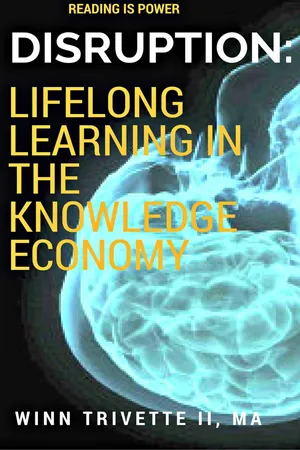![]()
CHAPTER 1: WHAT IS THE KNOWLEDGE ECONOMY?
Knowledge is our most powerful engine of production.
- Alfred Marshall, leading political economist, 1890
Knowledge, by its dictionary definition, is the facts, information, and skills acquired by a person through education or experience.
Epic shifts in human history, like from hunter-gathering to farming and the arrival of the Industrial Revolution 12,000 years later, are not rare however consequential.
Our Digital Age bypasses smokestacks for smartphones and tablets and heralds another important societal change that many may feel unprepared to compete.
The World Bank identifies four pillars of the Knowledge Economy.
1) institutional structures that provide incentives for entrepreneurship and the use of knowledge, 2) skilled labor and good education systems, 3) information and communication technologies (ICT) infrastructure and access, and, finally, 4) a vibrant innovation landscape that includes academia, the private sector and civil society.1
The Knowledge Economy today is based on the production, management, distribution and use of knowledge and information.
Therefore, a premium is on literacy, computation, computer skills, and above all, a high-level education.
A new stratification of labor divides those with more credentials versus those with less.
For example, participation in the Digital Economy ranges from a retail store clerk reordering stock with a hand-held computer or tablet to a technician programming street lights in downtown Berlin.
There is no speculation on who receives higher compensation for their contributions to the Knowledge Economy.
Ahead in this chapter, it is important to deepen your understanding of the different types of knowledge.
Then, you gain an appreciation of the importance of the oft cited maxim – Knowledge is power.
Finally, I summarize the first chapter that sets up the exploration of learning, and thriving in the Knowledge Economy later in the text.
![]()
Different Types of Knowledge
Two main types of knowledge are tacit and codified.
Each are interconnected.
A knowledge-based economy is characterized by the need for continuous learning of both codified and tacit information (the skill to use it).
Tacit knowledge comes from your own learning.
This know-how (see below) is a class of knowledge that's difficult to communicate.
An experienced chess player cannot easily show an average player how to become a grand master in a short amount of time.
The individualized nature of tacit knowledge makes it unique to every person.
On the other hand, codified knowledge is documented.
For example, the information in a textbook is recorded or codified knowledge.
Codified knowledge might be considered as the material to be transformed, and tacit knowledge, particularly know-how, as the skill for handling this material.2
Capabilities for selecting relevant and disregarding irrelevant information, recognizing patterns in information, interpreting and decoding information as well as learning new and forgetting old skills are highly coveted among businesses today.
![]()
In the digital Knowledge Economy, four more defined types of knowledge are important: know-what, know-why, knowhow and know-who.
Information is “know-what” and “know-why” components of knowledge.3
Know-what refers to knowledge about “facts”.
For example:
How many people live in Sao Paulo?
What are the ingredients in chocolate buttermilk pancakes?
When was the Battle of Hastings?
This is knowledge – what is normally called information – broken down into small components and transferred from a textbook.
In many highly specialized fields, experts need this knowledge in order to fulfil their jobs.
Lawyers and doctors fit this category.
Know-why refers to scientific knowledge of the principles and laws of nature.
This kind of knowledge underlies technological development and product and process advances in most industries.
The production and reproduction of know-why is often organized
in specialized entities, like research laboratories and universities.
Access is only available either through recruiting scientifically-trained talent or directly through contacts and joint activities.
Know-how refers to skills or the capability to do something.
A product development manager analyzes a market to dete...






